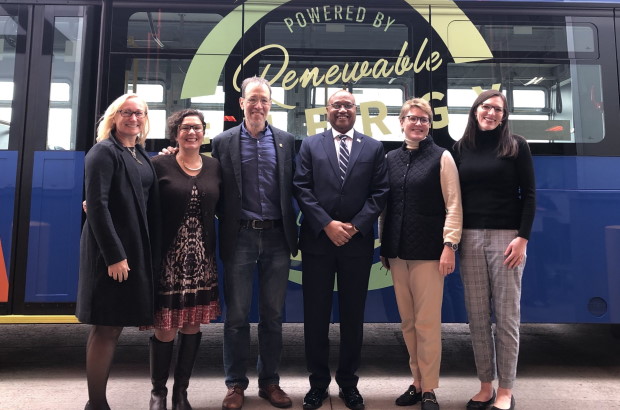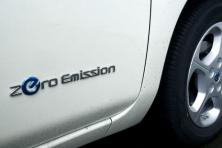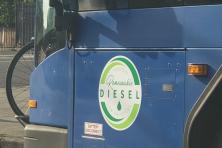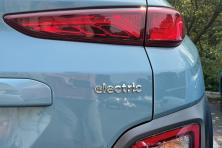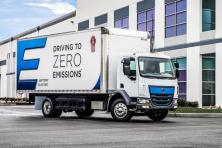You may have heard the terms renewable diesel and biodiesel and asked yourself, “How can diesel be renewable?” Well, both renewable diesel and biodiesel are diesel fuels that are produced from feedstocks such as waste greases and oils, animal tallows, and some vegetable oils like canola (instead of fossil fuels like petroleum), which undergo different refining processes to come out as a fuel that can be used in diesel engines.
While biodiesel—which is blended with petroleum-based diesel fuel —has been around for a long time, interest in renewable diesel has been skyrocketing lately. Renewable diesel can completely replace fossil diesel as a drop-in alternative fuel in a diesel engine, while also significantly reducing climate pollution (60 percent average reduction in greenhouse gas emissions, compared to petroleum diesel) and air pollution (40 percent particulate emission reduction).
How renewable diesel fits into the decarbonization puzzle
While we are putting all our efforts into transitioning our transportation sector to be made up of 100% zero-emission vehicles powered by renewable energy, this transformation will not happen overnight. The strong climate policies, regulations and executive orders put in place in the last couple of years such as the Oregon Climate Action Plan (OCAP), the Climate Protection Program, the Advanced Clean Truck regulation, the ZEV Standard and many supportive legislative bills have committed our state to achieving strong greenhouse gas emission targets and a shift from internal combustion engines to electric vehicles by mid-century.
However, while we have begun the transition to electric vehicles of all types, it will take time to cycle through existing fleets and replace every car, truck, bus, delivery van, and tractor-trailer on the road with zero emission versions. The unfortunate reality is that diesel engines still make up the overwhelming majority of the trucks and buses on the road. In the meantime, Oregon’s transportation sector is responsible for nearly 40 percent of our state’s total climate pollution and much of the air pollution that is harming our lungs and health, especially within environmental justice communities.
On our way to a zero-emission future, we must be doing everything we can to reduce emissions and air pollution in the short term. Renewable diesel can help us meet our interim goals as long as the ultimate goal is to transition as quickly as possible to zero-emission vehicles powered by clean electricity. Some key benefits of renewable diesel include:
- Replacing diesel in the dirtiest fleets: Medium and heavy-duty vehicles—like semi-trailer trucks and buses—account for 42 percent of all greenhouse gas emissions released from the on-road vehicle fleet. Switching to renewable diesel means we can dramatically reduce our climate pollution from the trucking sector while we continue transitioning to zero emission vehicles.
- Lower carbon: Renewable diesel emits at least 60 percent less greenhouse gas emissions than petroleum diesel, depending on engine type.
- Cleaner air: Renewable diesel can improve air quality compared to petroleum diesel because it emits less particulate matter (PM2.5) and nitrogen oxide (NOx)—two harmful byproducts of diesel exhaust known to cause cancer, asthma, and other illnesses.
- Drop-in fuel: Renewable diesel is a “drop in” fuel meaning that we do not have to invest in new infrastructure or special vehicles to use this fuel and reap the benefits of it. All diesel engines can run on renewable diesel without needing special equipment. This is a key advantage of renewable diesel over CNG/RNG vehicles and their required infrastructure investments.
Getting electricity and cleaner fuels on the market
The entire West Coast is an excellent place to substitute lower carbon emission fuels, thanks to the clean fuels programs that each state has enacted. Oregon’s Clean Fuels Program basically requires any fuel to be below a level of carbon intensity (or level of climate pollution from the beginning to end of a fuel’s creation) or pay a fine to the program. Money then generated from the program can then be spent on programs that encourage the acceleration of electricity as a fuel. Examples of this include Pacific Power’s Electric Mobility Grant program and PGE’s Drive Change Fund that help finance programs such as school bus electrification, public charging stations for electric vehicles, purchasing electric bikes, electric tractors, and more!
Another important benefit of the program is that fossil fuel distributors essentially subsidize the cost of producing lower carbon renewable fuels. The result is renewable diesel costs pennies more than fossil diesel in Oregon, whereas it costs more than a $1 more per gallon in states without a Clean Fuels Program. This year, the Oregon Department of Environmental Quality is expected to expand the Clean Fuels Program targets of fuels to 25 percent or more (potentially up to 37 percent) by 2035, meaning that the need for a supply of cleaner fuels will only continue to rise.
Supply and demand of renewable diesel
While supplies of renewable diesel remain limited, government policies that require the purchase of renewable diesel can spur the supply chain to catch up. The biggest challenge to converting all diesel vehicles in Oregon to renewable diesel is fuel availability. While large fleet operators that have their own storage tanks can fill those tanks with renewable diesel today, those that rely on private (cardlocks) and public (gas stations) fueling have limited access to renewable diesel to date. As of May 2022, only one private cardlock in Ashland and one public gas station in Bend currently offer renewable diesel.
Oregon also needs policy changes that will accelerate the availability of renewable diesel. The 2022 legislative session contemplated HB 4141, which was originally introduced to require a transition from fossil diesel to renewable diesel, first in the Portland Metro region, and eventually statewide. While this bill was amended to shift to a study of renewable diesel, we expect this important legislation to return for the 2023 Oregon Legislative Session. Cities are also taking the lead. For example, the City of Portland is exploring the expansion of their Renewable Fuel Standard with the goal of reducing dependence on fossil fuels.
Example of renewable diesel as a bridge fuel to clean electricity
TriMet, who has been the state’s largest user of diesel, exemplifies the role of renewable diesel in decarbonizing its fleet of 700+ transit buses. TriMet has committed to shift to a 100% zero emission bus fleet by 2040, replacing existing diesel buses with electric buses year-over-year. While TriMet is only purchasing zero-emission buses from now on to achieve its 2040 goal, TriMet has also shifted to using only renewable diesel for their hundreds of diesel-powered buses still on the road. In just six months, TriMet’s switch to a renewable diesel blend—coupled with using renewable electricity to fuel their growing fleet of electric buses—has cut their agency-wide emissions by 63 percent. With these two moves, TriMet estimates they are reducing the same amount of climate pollution as removing 15,000 cars off the road!
The Port of Portland, Titan Freight, and other major users of diesel have also made the switch to renewable diesel. It has become the cleaner fuel of choice for Oregon public transit vehicles and public fleets that run on diesel engines and is becoming the same even for private trucking fleets. With a zero emission electric future underway, this increased use of renewable diesel in legacy diesel fleets is a very good thing for Oregon’s climate and air.
